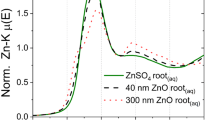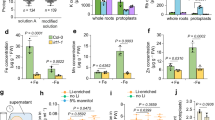Abstract
IT is well known that chemical elements can be concentrated in very large factors by plant cells, that is to say, the final concentrations in the cells may exceed those in the media by many orders of magnitude. Enrichment is often observed not only for elements that are essential for the plants, but also for elements not known to be essential, and even sometimes for elements that normally do not occur to any extent in plants.
This is a preview of subscription content, access via your institution
Access options
Subscribe to this journal
Receive 51 print issues and online access
$199.00 per year
only $3.90 per issue
Buy this article
- Purchase on Springer Link
- Instant access to full article PDF
Prices may be subject to local taxes which are calculated during checkout
Similar content being viewed by others
References
See Dainty, J., Ann. Rev. Plant Physiol., 13, 379 (1962).
Broda, E., Desser, H., and Findenegg, G., Naturwiss., 51, 361 (1964).
See Epstein, E., Ann. Rev. Plant Physiol., 7, 1 (1956).
Krausz, H., and Broda, E., Monatsh. Chem., 96, 695 (1965).
See Briggs, G. E., Hope, A. B., and Robertson, R. N., Electrolytes and Plant Cells (Oxford, 1961).
Author information
Authors and Affiliations
Rights and permissions
About this article
Cite this article
FINDENEGG, G., BRODA, E. Mechanism of Uptake of Trace Elements by Plant Roots. Nature 208, 196–197 (1965). https://doi.org/10.1038/208196a0
Issue Date:
DOI: https://doi.org/10.1038/208196a0
This article is cited by
-
Zinc uptake by rice, as affected by metabolic inhibitors and competing cations
Plant and Soil (1974)
Comments
By submitting a comment you agree to abide by our Terms and Community Guidelines. If you find something abusive or that does not comply with our terms or guidelines please flag it as inappropriate.



